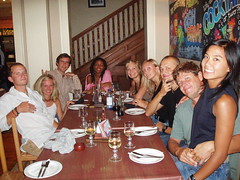Last night, I shared my birthday with one of my classmates, Lauren (2nd from the left), at a fish/sushi restaurant called Simply Fish. It's located on the popular street called Florida Road and the set up reminded me of Seattle's Pier fish market (because of the chalkboard signs) come the colonial times. The sushi was surprisingly good and the company made the night full of laughs and conversations. Ayanda, (4th from left) told us about her job here in Durban. She is a training coordinator for the city to get the traditional leaders or the "amakosi" to adapt their rule with current constitutional democratic rule of law. In Durban there are 17 amakosi. These 17 individuals are then ruled under the king called the "Goodwill". Traditional leaders are important to the democratic process because during apartheid, they were mainly responsible for communicating with the population. The rural communities listen to these leaders and therefore a mutual understanding between both the ANC and traditions would be beneficial for effective government. There is the argument that the traditional leaders are offered stock options and free computers which is not cohesive to democratic rule. However, which leaders today do not have their hands in certain industries and business and have the capability to run their electoral office without a computer? I am sure monarchy and rule by lineages will fade with evolution of politics, but there should also be a second thought when accusing these traditional leaders of corruption without looking at our own leaders and their personal agendas.

1 comment:
thanks, mandy! i'll be sure to have my dancing shoes on when i see you!
Post a Comment